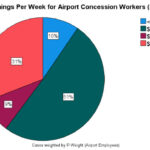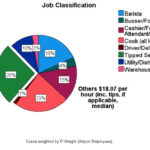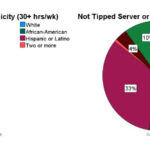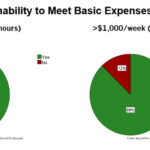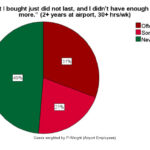 Labor Force
Labor Force
One Job is Not Enough: Working Poverty at Sky Harbor International Airport
November 21, 2023Executive Summary
The remarkable rise in housing costs in metropolitan Phoenix over the last seven years has caused a crisis for workers in many industries, but especially for hospitality workers. From 2016 to 2021, real estate brokerage firm Colliers noted Metro Phoenix residential rents jump 80%, while the federal reserve found median household incomes increased only 22%. Workers continue to lose ground. With the most recent data since 2021, rents have risen 10% annually, but wages only 4%.
This crisis of working poverty, which includes housing affordability, food insecurity and other daily struggles, is a difficult one that will demand the attention and focus of all of our elected leaders. As this study will show, the City of Phoenix, and the concessionaires with whom they contract for services face a situation where hundreds, if not thousands of workers at Sky Harbor Airport, while working full time jobs, are struggling to feed and house themselves and their families. Rather than following the trend of creating poverty jobs and leaving hard working members of our community struggling to make basic ends meet, the City of Phoenix and its contractors should improve employment opportunities at Sky Harbor Airport, one of the largest employers and economic drivers in Arizona to raise the standards for working people in Arizona and offer fair living wages for these important city workers.
Sky Harbor International Airport generates economic output worth $45.1 billion for the Greater Phoenix region, with an average of 125,000 passengers traveling through the airport daily. Owned by the City of Phoenix, Sky Harbor leases space to companies as concessionaires that provide food and beverage (F&B), retail, ATM, advertising and rental car services. The 66 F&B and 49 retail outlets employ thousands of concession workers at the airport. Employers include billion-dollar, multinational companies like Host International and SSP America, as well as smaller businesses. These employees are on the frontline providing customer service for weary travelers, making them critical contributors to the Sky Harbor Airport economy. SSP and Host operate well-known brands such as Starbucks, Pita Jungle, and Four Peaks. Retail concessions include contracts with Hudson Group, Paradies Lagardè, and Stellar Partners, all owned by large national and international corporations.
The vast majority of concession workers at the airport work in airport F&B outlets in positions that include baristas, bartenders, food servers, cooks, utility workers, and hosts among others. These positions start as early as 4 am in the morning to ensure that F&B outlets are open and prepared to serve passengers at least 90 minutes before the first flights depart each day. Some employees are required to stay until after the last flight departs and these hours will vary depending on flight delays. Most employees are provided with free parking, but for those who do not have a car, traveling to work can pose challenges related to the availability and reliability of public transportation and the cost of alternative options. While F&B employees work for concessionaires, the terms of the employment are partly defined by their employers’ contracts with the City of Phoenix.
In Summer 2023, the Worker Power Institute funded research to better understand the financial circumstances of F&B airport concession workers at Sky Harbor Airport. It contracted the Grand Canyon Institute to analyze survey findings and conduct interviews with a cross-section of survey respondents. This report has been written in collaboration with the Worker Power Institute.
Survey respondents included 273 of 1,200 F&B concession workers at HMSHost and SSP America, the two largest airport concessionaires and were weighted to match their actual distribution across employers and occupations, leading to a margin of error of 5.2%. Employees at both of these companies are represented by the hospitality workers union UNITE HERE Local 11. Those 273 F&B workers answered questions about their positions, length of employment, income and their ability to meet their financial needs.
Demographics of survey respondents include that:
- More than half are female.
- More than half are under 40 years old.
- White workers were about one-third of workers
- Hispanic/Latino workers were about 30% of employees
- African-American workers comprised 27% of SSP America and HMSHost employees, a share that is four times greater than the metro Phoenix workforce.
The survey and subsequent interviews found that the financial challenges facing airport workers result in insecurities related to meeting their basic needs including making rent/mortgage payments as well as affording food, transportation, and health insurance. The greatest concern expressed by workers during interviews was paying their rent or mortgage, to the point of foregoing other expenses, to ensure they could keep a roof over their head. Almost half of respondents started their jobs this year, indicating a high rate of turnover among concession workers which is likely a reflection of the financial challenges workers experience. In August of 2022, the City of Phoenix introduced an airport worker child care scholarship program, subsidized by $4 million in federal funds from the American Rescue Plan Act, to help workers afford childcare. However, based on survey and interview responses, much more is needed to stabilize the airport concessions workforce and relieve the financial insecurity that full-time employees, who are critical to the operation of the airport, currently experience. This is inline with comments by City of Phoenix Mayor Kate Gallego, who stated in a tweet in April 2023 that “workers deserve a living wage.”
The following is an overview of the findings from this research:
Airport concessions workers struggle to meet their basic needs
- 60% of airport employees working at least 30 hours per week have gross earnings under $800 per week. This includes 80% of African-American workers and 70% of Hispanic/Latino workers.
- Almost half of workers working at least 30 hours per week report not being able to meet basic expenses.
- White workers are far more likely to report more than $1,000 per week in pre-tax income while Hispanic and African-American workers are far more likely to report less than $800 per week in pre-tax income.
- While nonHispanic white workers are one-third of the concessions workforce, they make up half the portion of workers in the highest paying jobs at the airport. These positions have lower turnover, representing more stable, longer tenured workers.
- Workers of color, especially African American workers, are concentrated in the much-lower paid job classifications amongst airport concession outlets; they reported significant economic insecurity and work in jobs where there is heavy turnover, comparatively speaking.
Making timely rent/mortgage payments is a struggle and a financial burden relative to overall pay
- Almost half of workers at the airport who are solely responsible for their rent pay more than 30% of their pre-tax income in rent—above the marker of affordability—and one-fourth pay more than 40% of their pre-tax income.
- One third of respondents live in a residence where the rent has been paid late sometimes or more frequently.
- More than half of respondents expressed varying degrees of uncertainty about their ability to pay their monthly rent/mortgage.
Airport workers are food insecure, in spite of working in the F&B industry
- Half of respondents often or sometimes in the last 12 months have run out of food and not been able to afford more.
- 1 in 4 respondents reported having many months where they had to cut the size of meals or skip meals.
- 60% of respondents who earn less than $800 per week have low or very low food security, with most of this group having very low food security despite being employed at the airport for 30+ hours per week for 2 or more years.
Affording car maintenance is a common challenge among airport workers who own a vehicle
- Employees utilize a variety of means to get to work with two-thirds relying on a personal vehicle. Others carpool, take the bus, light rail, Lyft or Uber, bicycle, skate or walk.
- Among employees who had worked at the airport for at least 2 years AND used a personal vehicle to get to work, nearly half cannot afford proper car maintenance.
- Employees who drive to work and cannot afford proper car maintenance were significantly more likely to report missing shifts due to a lack of reliable transportation.
While almost 80% of employees have health insurance, only half of those insured are covered by their employer’s healthcare plan.
- Due to high turnover and variable hours, only 40% of employees report being on the employer’s healthcare plan.
- 25% of employees rely on Medicaid, via the Arizona Healthcare Cost Containment System, for health insurance.
- 22% of employees do not have health insurance.
Based on the findings of this report we recommend:
- Raising the wages of concessions workers at Sky Harbor Airport
- Expanding and extending the City of Phoenix’s program of free on-site childcare options for Airport Workers
- Extending hours and routes, or otherwise providing enhanced public transport for workers at Sky Harbor
- Requiring that companies who win future contracts for concessions services at Sky Harbor pay a living wage that includes affordable quality health care to their employees at the airport
- That the City of Phoenix conduct a study regarding wage discrimination against African American workers in concessions at Sky Harbor Airport, and include protections against such wage discrimination in future Airport concessions contracts. Such safeguards could include the implementation of paid job training for African American workers, and the implementation of uniform and standardized systems for promotions and applications for promotion.
Dave Wells holds a doctorate in political economy and public policy and is the Research Director for the Grand Canyon Institute. He can be reached at DWells@azgci.org or by contacting the Grand Canyon Institute at (602) 595-1025 ex. 2.
The Grand Canyon Institute, a 501(c) 3 nonprofit organization, is a centrist think tank led by a bipartisan group of former state lawmakers, economists, community leaders, and academicians. The Grand Canyon Institute serves as an independent voice reflecting a pragmatic approach to addressing economic, fiscal, budgetary and taxation issues confronting Arizona.
Grand Canyon Institute
P.O. Box 1008
Phoenix, Arizona 85001-1008
GrandCanyonInsitute.org
Brendan Walsh holds a doctorate in American Studies and is the Executive Director of Worker Power Institute and the Co-Political Director for UNITE HERE Local 11. He can be reached at bwalsh@workerpower.com.
Worker Power Institute is a (501c3) multi-racial, multigenerational organization dedicated to achieving economic, social, and racial justice through community education, direct services, civic engagement, and policy advocacy.
Worker Power Institute
1021 S. 7th Ave, Suite 202
Phoenix, AZ 85007
info@workerpower.com
